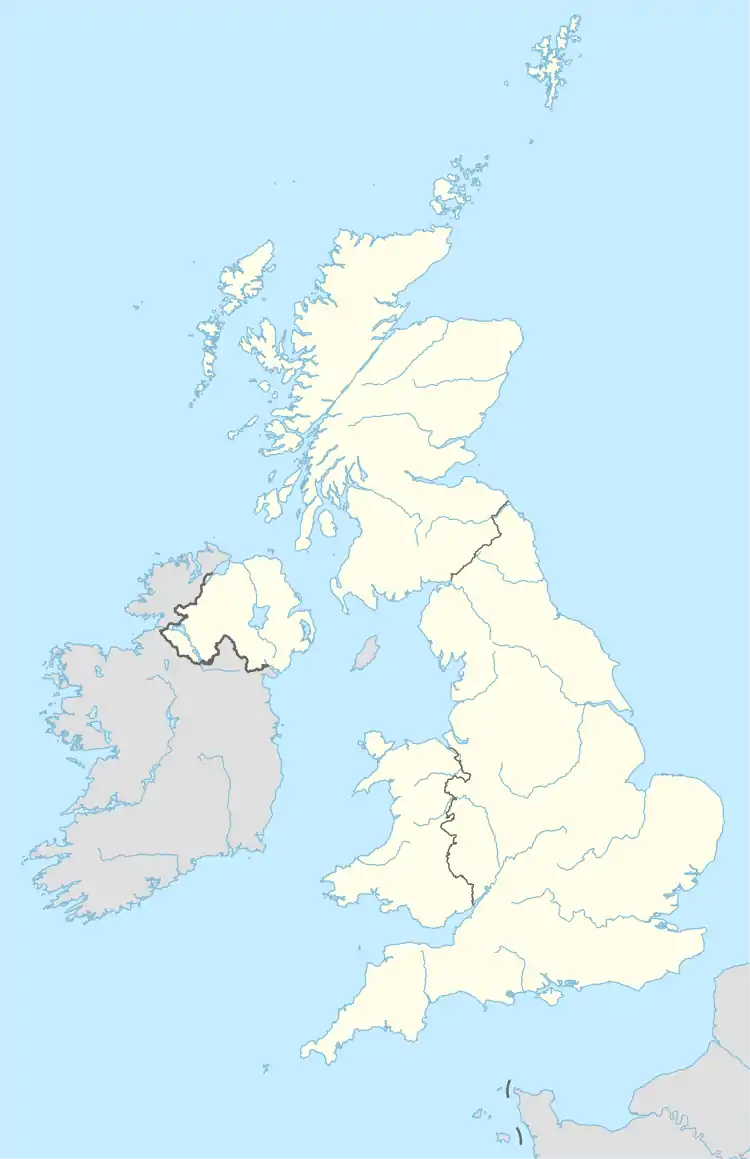| RAF Limavady RNAS Limavady | |||||||||||
|---|---|---|---|---|---|---|---|---|---|---|---|
| Limavady, County Londonderry in Northern Ireland | |||||||||||
 RAF Limavady Shown within Northern Ireland  RAF Limavady RAF Limavady (the United Kingdom) | |||||||||||
| Coordinates | 55°04′23″N 006°56′15″W / 55.07306°N 6.93750°W | ||||||||||
| Type | Satellite Station | ||||||||||
| Site information | |||||||||||
| Owner | Air Ministry Admiralty | ||||||||||
| Operator | Royal Air Force Royal Navy | ||||||||||
| Controlled by | RAF Coastal Command Fleet Air Arm | ||||||||||
| Site history | |||||||||||
| Built | 1940 | ||||||||||
| In use | 1940 - August 1945 | ||||||||||
| Battles/wars | European theatre of World War II Cold War | ||||||||||
| Airfield information | |||||||||||
| Elevation | 20 metres (66 ft)[1] AMSL | ||||||||||
| |||||||||||
Royal Air Force Limavady, or more simply RAF Limavady, is a former Royal Air Force station, also known as Aghanloo airfield, near the city of Derry, Northern Ireland.
History
The station was built in 1940 during the Second World War. The airfield was part of RAF Coastal Command and was important in the fight against U-boats in the Atlantic Ocean.[2]
- Units
The following units were also here at some point:
- No. 7 (Coastal) Operational Training Unit RAF (April 1942 - May 1944)[18]
- No. 22 Air Crew Holding Unit[17]
- No. 2754 Squadron RAF Regiment[17]
- Loran Training Unit RAF (April 1945) [19] became Coastal Command Anti U-Boat Devices School RAF (April - August 1945)[20]
During the Second World War the airfield was further used by the Fleet Air Arm when it was known as RNAS Limavady until 1958 when it was finally sold off.
Current use
After it was vacated by the military, the site was partly converted into an industrial estate with the rest returning to agricultural purposes. The runways and taxiways can still be seen from aerial imagery.[21][22]
References
Citations
- ↑ Falconer 2012, p. 128.
- ↑ "Move to preserve Limavady RAF buildings". Derry Journal. 29 June 2012. Retrieved 11 August 2017.
- ↑ Jefford 2001, p. 44 (No. 48 Sqn)
- ↑ Jefford 2001, p. 45 (No. 53 Sqn)
- ↑ Jefford 2001, p. 64 (No. 143 Sqn)
- ↑ Jefford 2001, p. 65 (No. 153 Sqn)
- ↑ Jefford 2001, p. 67 (No. 172 Sqn)
- ↑ Jefford 2001, p. 75 (No. 221 Sqn)
- ↑ Jefford 2001, p. 75 (No. 224 Sqn)
- ↑ Jefford 2001, p. 79 (No. 245 Sqn)
- ↑ Jefford 2001, p. 85 (No. 281 Sqn)
- ↑ Jefford 2001, p. 87 (No. 304 Sqn)
- ↑ Jefford 2001, p. 91 (No. 407 Sqn)
- ↑ Jefford 2001, p. 95 (No. 500 Sqn)
- ↑ Jefford 2001, p. 96 (No. 502 Sqn)
- ↑ Jefford 2001, p. 101 (No. 612 Sqn)
- 1 2 3 4 5 6 7 "Limavady". Airfields of Britain Conservation Trust. Retrieved 7 June 2020.
- ↑ Sturtivant, Hamlin & Halley 1997, p. 235.
- ↑ Sturtivant, Hamlin & Halley 1997, p. 202.
- ↑ Sturtivant, Hamlin & Halley 1997, p. 93.
- ↑ "RAF Limavady airfield control tower WW2". www.controltowers.co.uk. Retrieved 11 August 2017.
- ↑ "Limavady". www.forgottenairfields.com. Retrieved 11 August 2017.
Bibliography
- Falconer, J (2012). RAF Airfields of World War 2. UK: Ian Allan Publishing. ISBN 978-1-85780-349-5.
- Jefford, C G (2001). R.A.F Squadrons, A comprehensive record of the movement and equipment of all RAF squadrons and their antecedents since 1912. UK: Airlife Publishing Ltd. ISBN 1-84037-141-2.
- Sturtivant, R; Hamlin, J; Halley, J (1997). Royal Air Force flying training and support units. UK: Air-Britain (Historians). ISBN 0-85130-252-1.